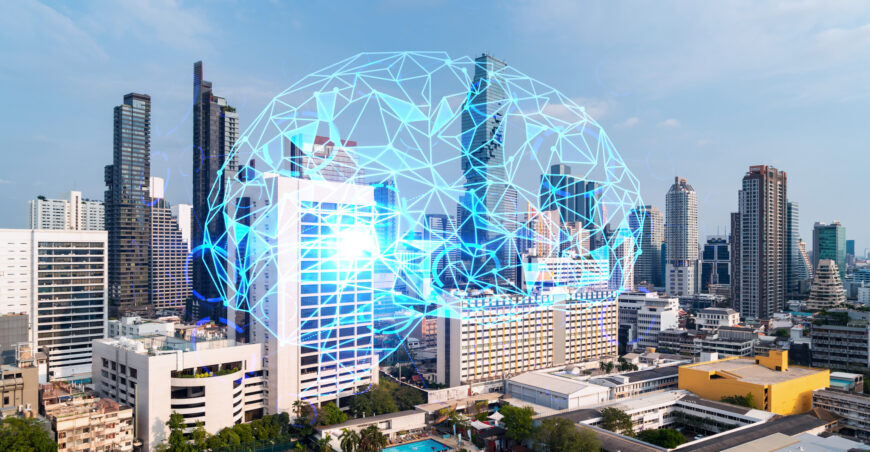It’s clear at this point that AI will continue to play a bigger and bigger role in all industries, and AI in commercial real estate is no exception. What isn’t clear is just how quickly this technology will penetrate the industry.
The automation AI provides is already helping firms lower the costs associated with property management, data organization and processing, among other things. In this article, we detail how artificial intelligence and the technologies that surround it are currently impacting commercial real estate.
Detailed CRE Analytics
Perhaps the biggest opportunities associated with today’s technologies involve AI for the use of analytics. The analytics that AI currently provides the commercial real estate market with include advanced forecasting and trends.
AI tools can process data for economic factors, property features, sales information and more to give the most accurate forecast for price and market movement. These tools can help professionals minimize risk and make the most up-to-date and informed decisions.
Automation Systems
The automation of the processes and systems that surround CRE lacks behind other industries, but that doesn’t mean it’s non-existent. AI is already being used to help automate aspects of building operations like scheduled maintenance and general building system controls.
Property Management
For property managers, AI can help simplify an array of operational practices.
• Collecting rent
• Receiving and handling maintenance requests
• Managing lease renewals
• Organizing historical records
• Data entry
AI is already helping property managers save time and better organize their management processes. In similar businesses, 60% of operators believe AI will increase productivity and efficiency.
Modeling and Forecasting
One use of AI that’s expected to take off in the coming years is financial modeling. With AI, the labor intensive process of data entry is taken care of with automation. After that, pattern recognition algorithms are utilized to break down the data to help professionals assess trends and market patterns.
Better Property Valuations
Since AI uses automated processes to collect and evaluate data, the overall property evaluation processes has become shorter and more accurate. Today’s AI algorithms can account for large amounts of data across inputs such as property features, location, local market trends, historical sales, and more.
Better Marketing
Like the other facets of real estate that AI will have an impact on, marketing comes with lots of data; anytime there is large amounts of date, there is opportunity for automation and optimization.
AI is already helping today’s CRE professionals analyze market data and trends to regularly update and adapt their own strategies and marketing campaigns. Aggregate algorithms, SEO tools, language processing tools, and chatbots are a few of the many AI tools used to improve marketing practices today.
AI in Commercial Real Estate Provides Improved Customer Experience
While there is certainly an argument that AI might end up making the customer experience less “human,” there is still the benefit of 24/7 support to consider. Today’s AI tools (such as chatbots) can help guide the customer experience almost as well as a real employee, helping customers solve complex problems in minutes. Most importantly, chatbots can be used for around-the-clock support – something that many businesses couldn’t afford to offer until now.
Pros and Cons to AI in Commercial Real Estate
There is no denying the advantages associated with AI and related automation technologies. But like anything, AI comes with it’s downsides too.
Pros to AI in CRE:
• Improved efficiencies
• No human error
• Reduces operational costs
• Real-time analytics
• Unlimited automation potential
Cons to AI in CRE:
• Long way to go in terms of niche industry implementation
• Expected to slowly replace traditional job of “broker”
• Can quickly make firms less human and more rigid
• Custom software can be costly
Final Words on Artificial Intelligence (AI) and Commercial Real Estate
It’s clear that AI is here to stay. It’s already being used in commercial real estate to gather more accurate trends, improve customer communication, optimize operational processes, and automate a multitude of systems.
As it is the case with many new technologies, the adoption of AI will be slow. There is a learning curve associate with AI that will separate many of tomorrow’s businesses. Those willing to undertake the training and operational changes associated with AI will benefit from being early adaptors.
More Info on AI in Commercial Real Estate Market of Today
Without the right set of eyes, even the most precise AI-driven data can be hard to understand. For anything related to AI in commercial real estate markets, feel free to reach out to the ICRE Investment Team. Our professionals would be happy to discuss current market opportunities, today’s market data, and much more.
















